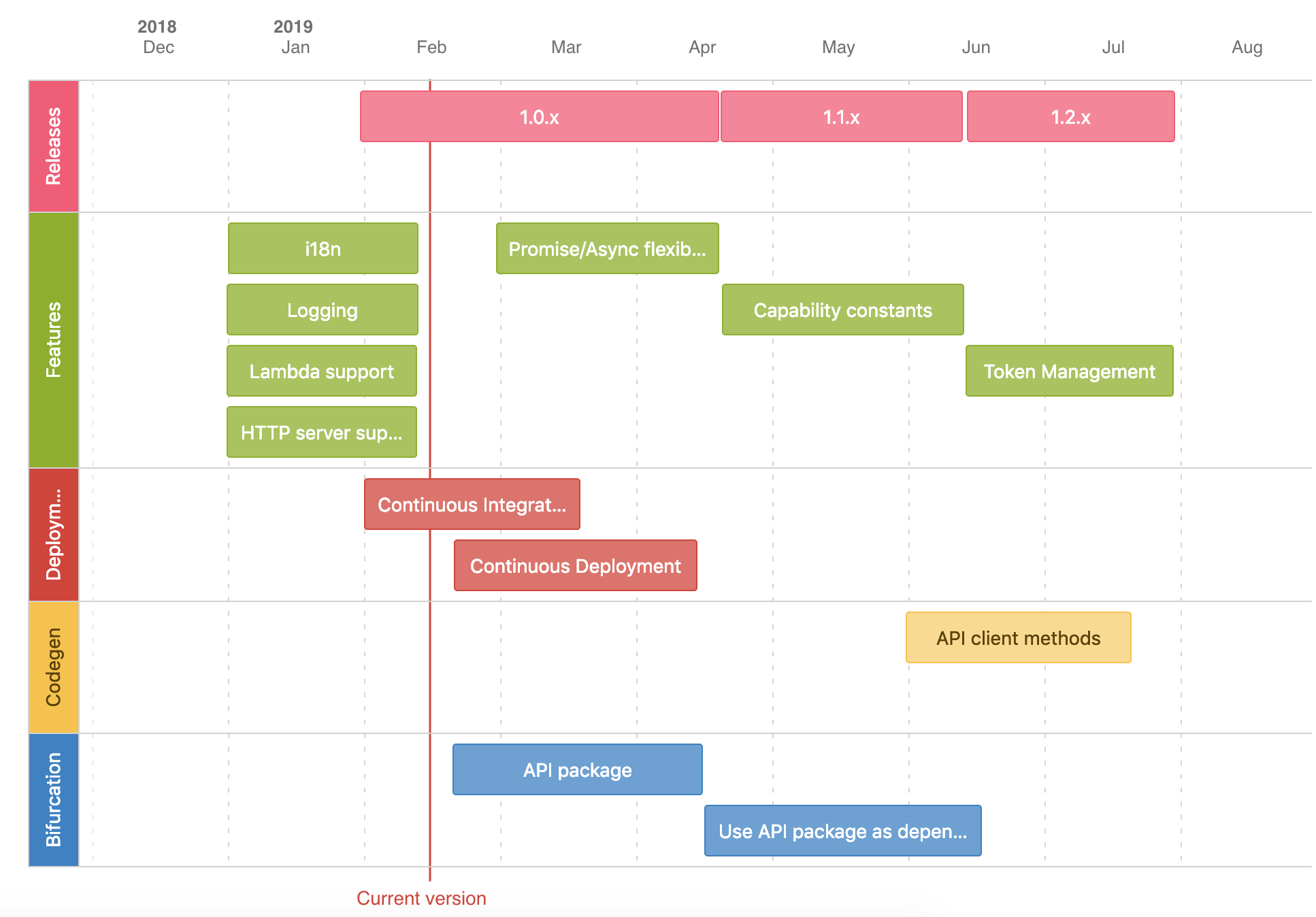SDK that wraps the SmartThings REST API and reduces the amount of code necessary to write a SmartApp app. It supports both webhook and AWS Lambda implementations. This is a preview version of the API and will change over time time.
npm i @smartthings/smartapp --saveNodeJS:
const smartapp = require('@smartthings/smartapp')Or, if you're transpiling to ES6/ES2015+:
import smartapp from '@smartthings/smartapp'- Javascript API hides details of REST calls and authentication.
- Event handler framework dispatches lifecycle events to named event handlers.
- Configuration page API simplifies page definition.
- Integrated i18n framework provides configuration page localization.
- Winston framework manges log messages.
The following example is the equivalent of the original SmartThings Groovy Let There Be Light app that turns on and off a light when a door opens and closes.
To run the app with an HTTP server, like Express.js:
const express = require('express');
const smartapp = require('@smartthings/smartapp');
const server = module.exports = express();
const PORT = 8080;
server.use(express.json());
/* Define the SmartApp */
smartapp
// @smartthings_rsa.pub is your on-disk public key
// If you do not have it yet, omit publicKey()
.publicKey('@smartthings_rsa.pub') // optional until app verified
.app.enableEventLogging(2) // logs all lifecycle event requests and responses as pretty-printed JSON. Omit in production
.configureI18n()
.page('mainPage', (context, page, configData) => {
page.section('sensors', section => {
section.deviceSetting('contactSensor').capabilities(['contactSensor']).required(false);
});
page.section('lights', section => {
section.deviceSetting('lights').capabilities(['switch']).multiple(true).permissions('rx');
});
})
.updated(async (context, updateData) => {
// Called for both INSTALLED and UPDATED lifecycle events if there is no separate installed() handler
await context.api.subscriptions.unsubscribeAll()
return context.api.subscriptions.subscribeToDevices(context.config.contactSensor, 'contactSensor', 'contact', 'myDeviceEventHandler');
})
.subscribedEventHandler('myDeviceEventHandler', (context, event) => {
const value = event.value === 'open' ? 'on' : 'off';
context.api.devices.sendCommands(context.config.lights, 'switch', value);
});
/* Handle POST requests */
server.post('/', function(req, res, next) {
smartapp.handleHttpCallback(req, res);
});
/* Start listening at your defined PORT */
server.listen(PORT, () => console.log(`Server is up and running on port ${PORT}`));To run as a Lambda function instead of an HTTP server, ensure that your main entry file exports smartapp.handleLambdaCallback(...).
Note: This snippet is heavily truncated for brevity – see the web service example above a more detailed example of how to define a
smartapp.
const smartapp = require('@smartthings/smartapp')
smartapp
.app.enableEventLogging() // logs all lifecycle event requests and responses. Omit in production
.page( ... )
.updated(() => { ... })
.subscribedEventHandler( ... );
exports.handle = (event, context, callback) => {
smartapp.handleLambdaCallback(event, context, callback);
};
Configuration page strings are specified in a separate locales/en.json file, which can be automatically created the first time you run the app. Here's a completed English localization file for the previous example:
{
"pages.mainPage.name": "Let There Be Light",
"pages.mainPage.sections.sensors.name": "When this door or window opens or closes",
"pages.mainPage.settings.contactSensor.name": "Select open/close sensor",
"pages.mainPage.sections.lights.name": "Turn on and off these lights and switches",
"pages.mainPage.settings.lights.name": "Select lights and switches",
"Tap to set": "Tap to set"
}If you are not familiar with SmartThings, we have extensive on-line documentation.
To create and manage your services and devices on SmartThings, create an account in the developer workspace.
The SmartThings Community is a good place share and ask questions.
There is also a SmartThings reddit community where you can read and share information.
Licensed under the Apache License, Version 2.0
Copyright 2019 SmartThings, Inc.


